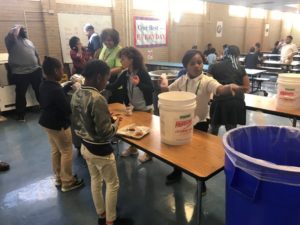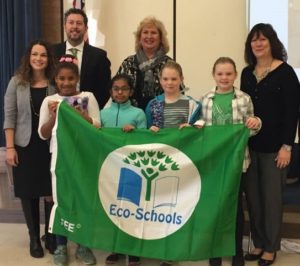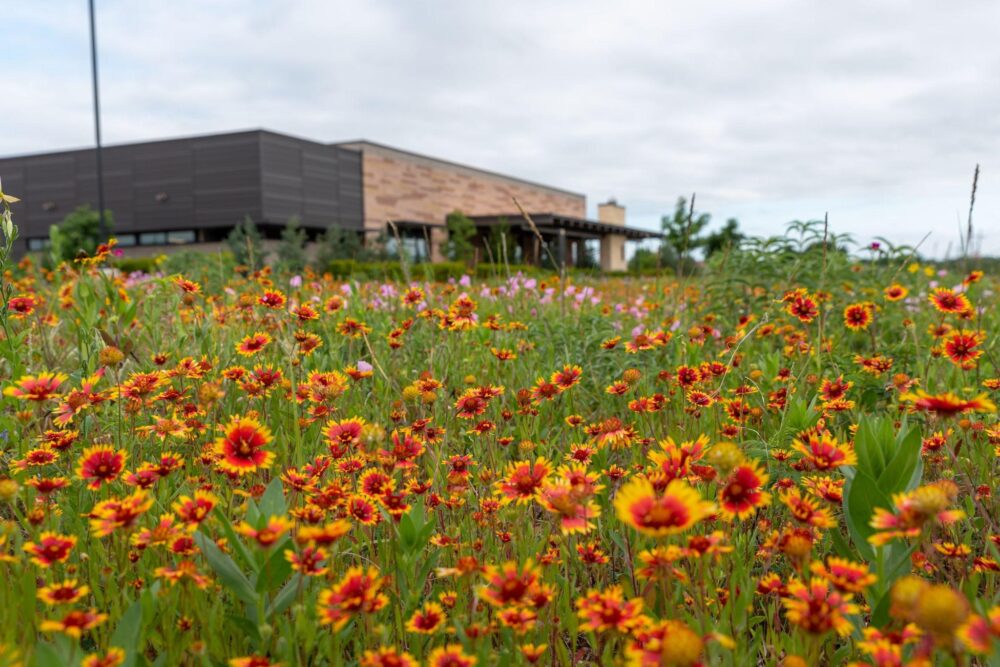We have much more to do and your continued support is needed now more than ever.
Schools in Delaware Are Making Big Strides
This Small State Is Taking Large Leaps Towards Sustainability

“Going Green has changed our school and the way our students learn and live.”
Leona Williams, a fourth grade teacher at Forwood Elementary School in Wilmington, Delaware, reflects on how her school’s journey towards sustainability has transformed the entire classroom culture. Forwood Elementary is one of two schools statewide that has earned the prestigious Eco-Schools Green Flag award in 2017. National Wildlife Federation’s Eco-Schools USA is a national green schools program combining effective green management of school ground, facilities, and curriculum while empowering today’s students for a sustainable tomorrow.
Ms. Williams’ school, as well as Emalea P. Warner Elementary School, which is also located in Wilmington, have achieved the highest honor within the National Wildlife Federation’s Eco-Schools USA program for their work on “greening” physical structure and grounds, conserving natural resources, and integrating environmental education into their curriculum. These two newest Green Flag schools join St. Andrew’s School and Mt. Pleasant Elementary School as the top Eco-Schools in Delaware. Delaware is also home to seven Green Ribbon Schools and one Green Ribbon School District, an award given by the U.S. Department of Education. For being one of the smallest states, a large number of Delaware schools are getting serious about their green achievements!

At Forwood Elementary, a fifth grade field trip to the Delaware Solid Waste Authority motivated students and teachers to take action school-wide to initiate a recycling program. Classroom discussions about where food comes from resulted in the installation of a bountiful and healthy vegetable garden that every grade gets to enjoy. An assembly and lecture on “energy vampires” prompted a change in the students’ energy conservation behavior and a school-wide Energy Expo supported by Practical Energy Solutions. These actions resonate throughout the school, and not only do they engage students to be stewards of the environment, support sustainability, and connect to curriculum standards, but they also save the school money!
At the Green Flag award ceremony last month, many students expressed how becoming an Eco-School has changed the way they live their lives, both at school and at home. Students took ownership of the projects on their campus and were excited to explain the environmental benefits of their Certified Schoolyard Habitat®, vegetable garden, recycling program, energy saving tactics, tree grove, and compost pile.

Likewise, Warner Elementary School has found ways to integrate sustainable practices throughout their school. They select student ambassadors from each homeroom to be part of their green team, who in turn help educate and engage their fellow students about the sustainability initiatives around campus. These green team members assist students in sorting their waste at every lunch, and beam with pride every time they save a recyclable milk jug from the trash can. The student-led green team recycling efforts resulted in a reduction of the school’s weekly trash by over 100 pounds. They also helped plant a schoolyard vegetable garden that fed the whole school sweet potatoes, tomatoes, corn, green beans, lettuce, and squash as part of their normal lunch menu. Finally, Warner Elementary performed a school-wide energy audit, and by teaching all students how to take action to save energy, they have reduced their energy use by 5808 kilowatt hours.
These actions represent not only a change in the school campus and culture, but a fundamental change that permanently influences student behavior as they share their experiences with their family and their community. The steps that both Forwood and Warner Elementary Schools have taken to earn the Green Flag award ensure a sustainable future for their school and a sense of stewardship that the students will carry with them even after the school year has ended.

The impressive results of these two schools and the relatively high number of Eco-Schools in Delaware could not have happened without Green Building United’s (GBU) Delaware Pathways to Green Schools program and its funders including the Delaware Sustainable Energy Utility (DESEU). This program provides K-12 teachers in Delaware with the training, resources, and support needed to engage their students and school communities in becoming leaders in environmental stewardship. The Delaware Pathways to Green Schools program, in partnership with the National Wildlife Federation, has enrolled over 31 schools that have committed to sustainability through their participation in the Eco-Schools USA pathways. Participating Delaware Pathways schools are given the opportunity to apply for mini-grants for green projects and are invited to annual professional development workshops hosted by the National Wildlife Federation’s affiliate partner, the Delaware Nature Society, where they can learn how to integrate these projects into classroom instruction. This program has given schools the tools to shift towards sustainability, and its working!
If you have any questions or are interested in getting involved in the Delaware Pathways to Green Schools program or Eco-Schools USA, contact Holly Shields at ShieldsH@nwf.org.
Become an Eco-School Today!



















